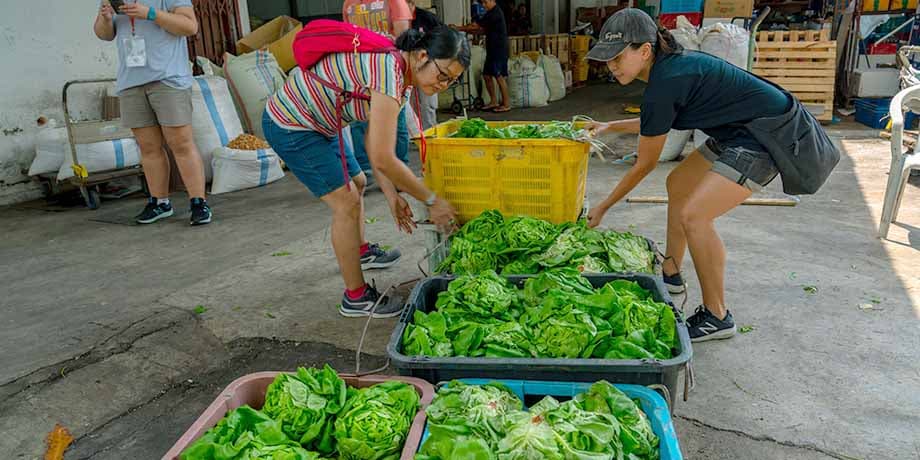These Food Waste Heroes are Rescuing Vegetables, One Truck at a Time
These Food Waste Heroes are Rescuing Vegetables, One Truck at a Time
Local volunteer group redistributes fruit and vegetables to tackle Singapore's weighty issue of food waste.
Sustainability is at the core of everything we do at Temasek. This article is part of Generational Investing, an ongoing series featuring individuals and activities that create a better world for future generations, through creativity, innovation and sustainable practices.

It seems like a regular busy weekday morning at Pasir Panjang Wholesale Centre as shopkeepers go about their daily activities, checking and receiving stocks, while customers shop for fresh fruit and vegetables.
Look closely, however, and you will notice that there are groups of people dashing about the wholesale centre, approaching shopkeepers and collecting cartons of unsold produce.
No, these are not contestants in The Amazing Race; they are volunteers from SG Food Rescue, a local community shining a spotlight on the growing issue of food waste in Singapore.

Make way; rescued fruit and vegetables coming through!
Rescuing Fruit and Vegetables
In 2017, the city-state generated a staggering 809,800 tonnes of food waste — equivalent to the weight of 54,000 double-decker buses. This number is set to increase alongside growth in population and economic activity, says the National Environment Agency.
What’s noteworthy is that more than 40 percent of food waste in industrialised countries like Singapore is said to happen at the retail and consumer levels.

Food waste makes up about 10 percent of the total waste generated in Singapore
And food waste at the retail level is what SG Food Rescue is trying to tackle with its vegetable rescue missions.
Every Thursday morning, co-founder Daniel Tay and other volunteers gather at Pasir Panjang Wholesale Centre to collect and redistribute fruit and vegetables that have been rejected, either for aesthetic reasons or simply because of oversupply.

Every Thursday morning, SG Food Rescue volunteers collect unsold fruit and vegetables from shopkeepers in Pasir Panjang Wholesale Centre
The group collects around a truckload of fruit and vegetables each week, equivalent to about 1.5 tonnes. About 10 percent of this goes to the volunteers, while the remaining 90 percent is distributed to charities and soup kitchens.

SG Food Rescue collects one truckload (or about 1.5 tonnes) of unsold produce every Thursday!
“You look at the waste statistics for food in Singapore, and you can see food that is thrown away and food that is recycled. But that’s it,” shares Daniel.
“What we do at SG Food Rescue is we reuse through redistribution. We take the food that’s thrown away and give it to someone else.”
Daniel is no stranger to tackling the problem of food waste — or waste in general. The 40-year-old financial planner is a self-proclaimed ‘freegan’, or someone who rejects consumerism and reduces waste by retrieving and using discarded items.
“Living as a freegan, there are three things that we do: we save money, we help other people and we reduce waste,” he shares.

Daniel Tay, co-founder of SG Food Rescue, at one of the many community fridges that the group frequently restocks with unsold vegetables (Photo: Daniel Tay)
Daniel famously spends next to nothing on food, choosing instead to collect unwanted food. He recalls, “I used to go to the back of the supermarket and [pick up discarded fruit and vegetables] about two to three times a week, but I stopped after three weeks because I ran out of space in my fridge.”
He relies on his senses to gauge if the food is still edible. “If it looks okay, smells okay, tastes okay, then it’s probably safe for consumption. If it fails any of these, play it safe and throw it away,” he explains.
Daniel’s dumpster-diving days, however, are over for now as he explores ways to combat waste at a broader level, such as with SG Food Rescue’s programmes.

Volunteers with SG Food Rescue are each given an identity tag as the wholesalers are not able to attend to members of the general public
Besides the weekly Pasir Panjang vegetable rescue missions, the group also gathers at Little India thrice weekly for a similar vegetable rescue programme, as well as restock community fridges in Yishun, Tampines and Queenstown.
Understanding the Value of Food
So, what can regular consumers do to fight food waste, we ask Daniel.
A good way to start is by buying “ugly” produce, says Daniel, as this will challenge the notion that imperfect produce cannot be sold or consumed.
Of course, selling ugly produce comes at a cost to the sellers as these are often sold at a cheaper price in order to attract customers. “Businesses will try to sell them if they can, but they also recognise that by selling imperfect food items, they earn less. They have to be okay with doing the right thing,” says Daniel.

Consumers can help to fight food waste by buying misshapen, blemished or discoloured produce
Already, there are certain initiatives in place in Singapore to combat food waste. NTUC FairPrice, for example, sells imperfect produce at discounted prices at selected outlets or repackages it ready-sliced.
Meanwhile, social enterprises like TreeDots supply the food and beverage industry with produce that is either imperfect, or close to expiry date.
“We need to change the way we measure the value of our food,” Daniel maintains. Instead of gauging food waste in terms of weight or monetary worth, he suggests, “Ask yourself how many meals you have thrown away. How many people could you have fed?”
If you change the language that you use, you’ll change the way you think about food.
Daniel Tay, Co-founder of SG Food Rescue

Volunteer with SG Food Rescue and you'll be able to do your grocery shopping too!


